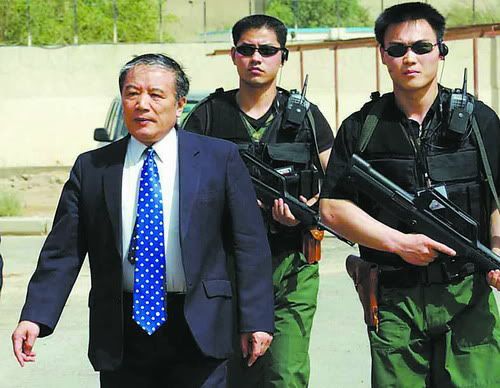During the recent Sudan hostage crisis, The Wall Street Journal reported that the Sudanese troops who engaged in the rescue effort were joined by a dozen armed Chinese private security contractors. While that article and coverage of the issue in the Chinese media didn’t identify where the contractors came from, there’s a strong likelihood they were drawn from the same pool of former security forces personnel that Shandong Huawei recruits from and perhaps even came from the company. Chinese sources say it was the Sudanese military that told news outlets armed Chinese contractors were participating, so it appears that Beijing wants to keep its use of private security contractors out of the public eye.
Lately I have noticed an upward trend in reporting about China and it’s private security. These three articles below help to paint that picture of what I am talking about. We have a situation where China has interests all over the world, their people are getting killed and kidnapped all over the world in higher numbers, and security situations are changing for the worse in some of these places they have set up shop in.
Not only that, but now Chinese businesses are demanding more protection and they have the money to buy it. Especially if Chinese PSC’s charge less than western companies.
This first article below talks about the company Shandong Huawei Security Group. I have never heard of them before, and I could not find a link to their website. Although I doubt I would put a link up to their site for fear of getting some virus or whatever. lol Either way, Shandong Huawei is supposed to be one of their top PSC’s.
The article also described an interesting situation going on in Iraq. As the security situation degrades and there is now a lack of western forces to keep things in check, companies like Shandong Huawei are stepping in to fill that security vacuum in order to protect companies like the China National Petroleum Corporation. Oil is of national interest to China, as it is to many countries, and PSC’s are a part of their strategy to protect those national interests.
In the quote up top it mentioned Sudan and the involvement of security contractors in the rescue of kidnapped Chinese workers. There is oil in the Sudan and China definitely has interest there. And if PSC’s are actively involved in rescue operations like this, then it is not far fetched to imagine PSC’s entering other areas of security which would border more military-like operations. Will we see a company like Shandong Huawei evolve into more of a private military company?
The other thing mentioned in this article is the strategic implications of Chinese PSC’s. Here is the quote:
There are a number of strategic implications of this rise of armed private security providers by Chinese firms. For a start, if a project is in an area unstable enough to require armed private guards, there’s a significant probability of armed encounters between security providers and potentially hostile locals. Coupled with this is the fact that given their police and military backgrounds, the contractors are likely to look and comport themselves like soldiers, and would probably be armed with similar types of weapons. There’s real potential, then, for confusion on the ground in a place like Sudan when a private contractor who looks like a soldier engages rebels or others who then mistake him for an actual member of Chinese government forces. A local whose relative was shot near a Chinese drilling site by a security guard who looks like a soldier is likely to blame Beijing, which could spark additional violence against Chinese interests in the area.
Yep. And if the local insurgency/gang/criminal elements are not getting their cut, then expect these groups to attack these Chinese ventures.
The second article below is very interesting to me because it is written by Chinese journalists and actually discusses the lack of experience that Chinese PSC’s have compared to American PSC’s. That they should ‘study’ American PSC’s….or steal trade secrets about such things. lol Either way, I thought this was cool that the Chinese have recognized the west’s expertise in this area. Check it out.
Calls for security guards from China to accompany workers posted in dangerous areas overseas have increased since kidnappings in Sudan and Egypt underscored the danger workers face as Chinese companies expand globally.
The abductions highlight the urgency to ensure the security of Chinese workers overseas, said Han Fangming, deputy director of the foreign affairs committee of the Chinese People’s Political Consultative Conference National Committee, on his micro blog.
Han said that there is a need to study how private security contractors in the United States, such as Academi, work and “when the time is right, the government might allow qualified companies” to establish such services…. Another factor to consider is how prepared the security services are to handle dangerous situations.
“I think security guards in China are far from the level of private security contractors like Academi in the US,” Fu said.
Yep. Private security contractors in the US, and our western partners, have all learned many hard lessons over ten years of warfare. If China plans on allowing PSC’s to do this kind of thing in war zones, then yes, they will be looking to all and any lessons learned in order to make that work. It is also a matter of Mimicry Strategy, and whatever works best, will be copied.
The final article discusses the enormity of the Chinese presence throughout the world. It also emphasizes the threat to these citizens and the upward trend of kidnappings. More kidnappings equals more ransoms. More ransoms paid equates to a creation of a kidnapping industry where individuals purposely target Chinese. That is the price China will pay if they plan on setting up shop in these dangerous parts of the world.
The dramatic rise in overseas travel and expatriate work by Chinese was punctuated by the recent kidnappings of Chinese workers in Sudan and Egypt. “Overseas Chinese protection” (haiwai gongmin baohu) has been a critical priority since deadly attacks killed 14 Chinese workers in Afghanistan and Pakistan in 2004. Between 2006 and 2010, 6,000 Chinese citizens were evacuated to China from upheavals in the Solomon Islands, East Timor, Lebanon, Tonga, Chad, Thailand, Haiti and Kyrgyzstan.
But a new urgency has arisen in the past year: in 2011, China evacuated 48,000 citizens from Egypt, Libya, and Japan; 13 Chinese merchant sailors were murdered on the Mekong River in northern Thailand in October 2011; and in late January 2012, some 50 Chinese workers were kidnapped in two incidents by Sudanese rebels in South Kordofan province and by Bedouin tribesmen in the north of Egypt’s Sinai Peninsula.
The worldwide presence of Chinese citizens – and the dependencies that generates – will only continue to grow: in 2012, more than 60 million Chinese people will travel abroad, a figure up sixfold from 2000, and likely to reach 100 million in 2020. More than five million Chinese nationals work abroad, a figure sure to increase significantly in the years ahead.
That is a lot of Chinese traveling and working throughout the world! As the word gets out amongst the thugs/terrorists/rebels of the world, we will continue to see this Chinese kidnap and ransom trend increase. That means more protection work, and more hostage rescue or negotiation work for this young Chinese PSC market. So yes, I would speculate that we are witnessing the rise of the Private Security Dragon and who knows where this will lead. –Matt

Enter China’s Security Firms
February 21, 2012
By Andrew Erickson & Gabe Collins
Chinese private security companies are seeing an opportunity as the U.S. withdraws troops from Iraq and Afghanistan. But plenty of complications await them.
A security vacuum is developing around Chinese workers overseas. The recent kidnapping of 29 Chinese workers in Sudan (where another worker was shot dead during the abduction) and 25 workers in Egypt has sparked a strong reaction in China. As a result, Beijing is looking to bolster consular services and protection for Chinese citizens working and travelling overseas. On the corporate side, private analysts are urging companies to do a better job of training employees before they are sent abroad. Yet with at least 847,000 Chinese citizen workers and 16,000 companies scattered around the globe, some of them in active conflict zones such as Sudan, Iraq, and Afghanistan, key projects and their workers are likely to require more than just an expanded consular staff to keep them safe.
It’s with an eye on this growing danger that new Chinese private security providers see a business opportunity. Shandong Huawei Security Group appears to be a leader among Chinese security providers, which thus far have predominantly focused on the country’s robust internal market for bodyguard and protective services. Huawei provides internal services, but in October 2010, opened an “Overseas Service Center” in Beijing. The company’s statement on the center’s opening explicitly cites the withdrawal of U.S. troops from Iraq, and the potential for a security vacuum to result, as key drivers of its decision to target the Iraq market.
(more…)

